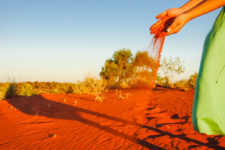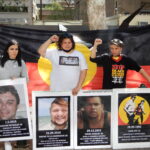The Colonisation of First Nations Land Is Far From Over

“It wasn’t me. That happened 200 years ago,” is a refrain everyone who lives in this country has heard an Anglo Australian remark at one time or another, when the subject of the dispossession of this continent’s First Nations people has been raised.
The statement is based on the misguided concept that the First Fleet’s arrival in Sydney Cove 231 years ago, somehow marked the end of the invasion of the sovereign people’s lands, rather than marking the beginning of the colonisation project.
Some point to the last state-sanctioned massacre of Aboriginal people – the 1928 NT Coniston Massacre – as the end of the atrocities perpetrated upon the First Peoples. However, this overlooks the stolen children, the deaths in custody and mass incarceration that continues on until this day.
And further, the idea that colonisation happened somewhere in the dim past, fails to recognise that what’s been one of the largest land grabs in human history is an ongoing enterprise that continues under the auspices of the Crown.
At present, both federal and state governments are denying the rights of First Nations peoples, as they continue to pass laws, produce policies and make decisions in line with the desires of mining and industry, as if the myth of terra nullius had never been debunked.
Djab Wurrung country
The Djab Wurrung Heritage Protection Embassy was established in mid-June last year on an area of sacred land that VicRoads and Major Road Projects Victoria plan to run a 12.5 kilometre strip of highway across, with the seal of approval of the Andrews government.
The land holds deep cultural significance for the Djab Wurrung people, as it’s a place of women’s business that lies on a song line, and it holds over 200 sacred trees, one of which is a birthing tree that’s seen over 50 generations of locals born within the hollow of its trunk.
The strip of road set to be constructed is part of the Western Highway duplication project, meaning the trees will be destroyed so as to double up on a pre-existing stretch of highway. And a completely viable and cheaper alternative route – that avoids the site completely – has simply been overlooked.
Despite the long-term resistance at the site, the hundreds of protesters that demonstrated outside state parliament recently, as well as the decades-long assertions from Canberra that Indigenous interests are a concern, both the federal and state government have greenlighted the project.
Erasure of rights
Wangan and Jagalingou Family Council spokesperson Adrian Burragubba has spent the last seven years trying to prevent Indian mining giant Adani constructing the Carmichael coalmine on the lands of his people situated in Queensland’s Galilee Basin.
Mr Burragubba told Sydney Criminal Lawyers on 12 September that “the native title system and the processes are set up for extractive industries and projects”, like the Adani mine, “so as to override the rights” of First Nations people.
The traditional owner made the comments exactly two weeks after the Queensland government quietly extinguished native title over his land and granted Adani freehold title to it. This was despite the government’s initial assertion that it would issue a non-extinguishing lease over the land.
Indeed, as barrister Tony McAvoy SC explained last year the native title system is set up in such a way that if traditional owners don’t agree to what’s on offer, their rights can be removed, the land can be handed over to mining interests and the local people end up with nothing.
Legislating for Adani
Mr Burragubba challenged the validity of the “sham” Indigenous land use agreement (ILUA) relating to Wangan and Jagalingou land on a number of occasions in court. However, the Adani ILUA was almost rendered invalid by a separate Federal Court decision relating to a set of other ILUAs.
On 2 February 2017, the full bench of the Federal Court ruled that the Noongar native title settlement – the largest of its kind in Australian history – was invalid, as not all native title claimants had signed off on the ILUAs that made up the agreement.
It set a precedent that required all claimants to sign off on an ILUA for it to be valid. This threatened the yet to be registered Adani ILUA, as it relied on a majority agreement. So, the Turnbull government promptly passed a bill amending the Native Title Act 1993 (Cth) to reverse the decision.
Continued frontier war
The largest act of colonisation in recent times is the Northern Territory Intervention. In June 2007, the Howard government declared an emergency in the NT and sent around 600 Australian defence force troops into remote Aboriginal communities.
The pretext for this invasion of Aboriginal land was organised paedophile rings, which were subsequently proven not to exist. However, the assertions that this was going on in these communities was enough for the federal government to push ahead with the land grab.
The Racial Discrimination Act 1975 (Cth) had to be suspended, so the government could set up the “special measures” that would otherwise have been illegal. These included implementing welfare quarantining, alcohol bans and the abolition of a successful employment program.
As Australian scientist Dr Helen Caldicott reportedly said at the time, the intervention had nothing to do with child abuse, “but all to do with open slather uranium mining and converting the Northern Territory to a global nuclear dump”. Today, the Intervention continues on as Stronger Futures.
The colonising creed
Right now, Scott Morrison is over in the States. And he invited a few of Australia’s best-known modern colonisers to dine with him at a formal White House dinner. They included Gina Rinehart, a key landgrabber in the Kimberley, and Andrew Forrest, the man behind the BasicsCard.
On Monday, whilst Morrison was in the US, a UN climate action summit was taking place in New York. And despite 350,000 Australians taking to the streets in protest of government inaction on the climate crisis last Friday, the PM neglected to attend the meeting on the future of the planet.
Yet, this is hardly surprising, as the colonial program and fossil fuel expansion go hand in hand. And the elites are after short term profits at the cost of Indigenous peoples and climate. But, what the one percent is now failing to see is this paradigm can’t be sustained, and it’s time for system change.







